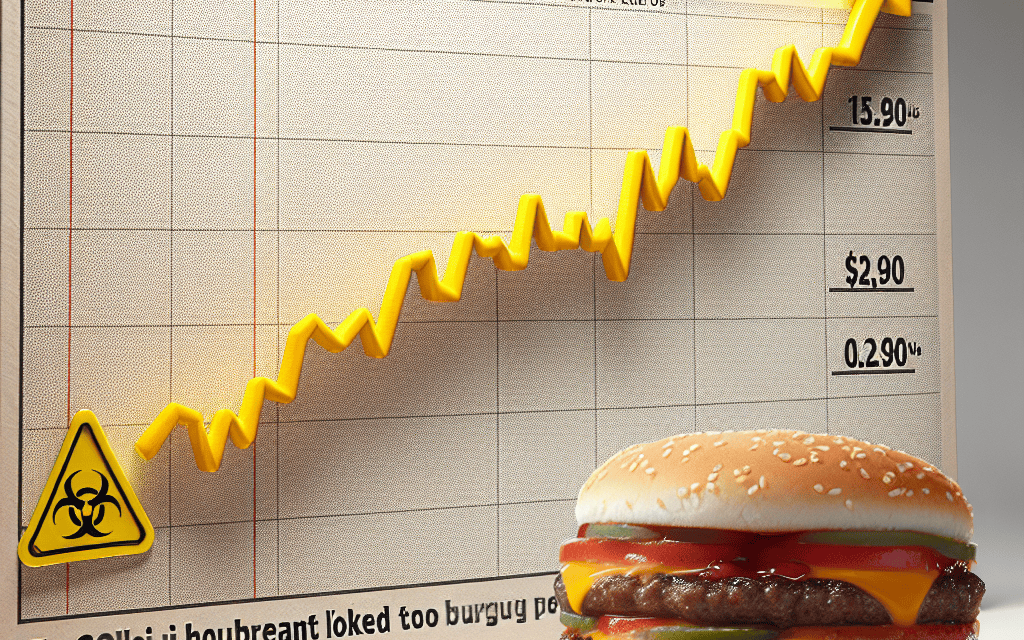“Quarter Pounder Panic: McDonald’s Shares Tumble Amid E. Coli Outbreak Link”
Introduction
In a significant development impacting the fast-food industry, McDonald’s shares have experienced a notable decline following an announcement from the Centers for Disease Control and Prevention (CDC). The CDC has linked an outbreak of E. coli infections to the consumption of McDonald’s popular Quarter Pounder burgers. This connection has raised concerns among consumers and investors alike, leading to a swift reaction in the stock market. The outbreak, which has affected multiple states, has prompted increased scrutiny of McDonald’s food safety practices and has put the company under pressure to address the situation promptly. As the investigation continues, McDonald’s faces the challenge of restoring public confidence while managing the financial repercussions of this health scare.
Impact Of E. Coli Outbreak On McDonald’s Brand Reputation
The recent decline in McDonald’s shares has been a significant point of concern for investors and consumers alike, following the Centers for Disease Control and Prevention’s (CDC) announcement linking an E. coli outbreak to the fast-food giant’s popular Quarter Pounders. This development has not only impacted the company’s financial standing but also raised questions about its brand reputation, which has been meticulously cultivated over decades. As the news of the outbreak spread, it became evident that the implications for McDonald’s extend far beyond immediate financial losses, touching upon consumer trust and brand loyalty.
Initially, McDonald’s was riding high on a wave of success, with its Quarter Pounders being a staple choice for many customers. However, the CDC’s findings have cast a shadow over this success, as consumers are now more cautious about their dining choices. The link between the E. coli outbreak and McDonald’s has led to a swift reaction in the stock market, with shares dropping as investors reassess the potential risks associated with the brand. This downturn reflects not only the immediate financial impact but also the broader concerns about food safety and quality control within the company.
Moreover, the outbreak has prompted a reevaluation of McDonald’s supply chain practices. In an era where transparency and accountability are paramount, the fast-food chain is under pressure to demonstrate that it can effectively manage and mitigate such risks. The company’s response to the outbreak will be crucial in determining how quickly it can recover from this setback. McDonald’s has already initiated a comprehensive review of its food safety protocols, aiming to reassure both consumers and investors that it is taking the necessary steps to prevent future incidents.
In addition to addressing the immediate concerns, McDonald’s must also consider the long-term impact on its brand reputation. The fast-food industry is highly competitive, and consumer perceptions can shift rapidly. While McDonald’s has a strong global presence and a loyal customer base, the E. coli outbreak serves as a reminder of the fragility of brand trust. To maintain its position as a leader in the industry, McDonald’s will need to engage in proactive communication strategies, emphasizing its commitment to food safety and quality.
Furthermore, the outbreak has sparked a broader conversation about the role of fast-food companies in ensuring public health. As consumers become more health-conscious, there is an increasing demand for transparency regarding the sourcing and preparation of food. McDonald’s, like many of its competitors, must navigate these evolving expectations while maintaining its appeal as a convenient and affordable dining option. The company’s ability to adapt to these changes will be a critical factor in its long-term success.
In conclusion, the E. coli outbreak linked to McDonald’s Quarter Pounders has had a profound impact on the company’s brand reputation. While the immediate financial repercussions are evident in the drop in shares, the long-term effects on consumer trust and brand loyalty are yet to be fully realized. McDonald’s faces the challenge of not only addressing the current crisis but also reinforcing its commitment to food safety and quality. By doing so, the company can work towards restoring its reputation and ensuring its continued success in the competitive fast-food industry.
Financial Implications Of McDonald’s Shares Drop
The recent decline in McDonald’s shares has captured the attention of investors and market analysts alike, as the Centers for Disease Control and Prevention (CDC) has linked an E. coli outbreak to the fast-food giant’s popular Quarter Pounder burgers. This development has not only raised concerns about food safety but also prompted a closer examination of the financial implications for McDonald’s, a company that has long been a stalwart in the fast-food industry. As the news of the outbreak spread, McDonald’s shares experienced a notable drop, reflecting investor apprehension about the potential impact on the company’s reputation and bottom line.
To understand the financial implications of this situation, it is essential to consider the broader context in which McDonald’s operates. The company has built its brand on a foundation of consistency, quality, and customer trust. Any threat to these pillars can have significant repercussions. The link between the E. coli outbreak and the Quarter Pounders has the potential to erode consumer confidence, which is a critical component of McDonald’s success. As customers become wary of the safety of the food they consume, they may choose to dine elsewhere, leading to a decline in sales and revenue.
Moreover, the financial impact extends beyond immediate sales figures. McDonald’s may face increased costs related to addressing the outbreak, including potential legal liabilities, compensation for affected customers, and expenses associated with implementing more stringent food safety measures. These additional costs could further strain the company’s financial resources, affecting its profitability in the short term. Furthermore, the outbreak may prompt regulatory scrutiny, leading to potential fines or sanctions that could exacerbate the financial burden on the company.
In addition to these direct financial implications, the situation may also affect McDonald’s stock performance in the long run. Investor sentiment plays a crucial role in determining stock prices, and any negative perception of the company’s ability to manage food safety risks could lead to sustained pressure on its shares. As investors reassess their confidence in McDonald’s, the company may face challenges in maintaining its market valuation, which could have broader implications for its strategic initiatives and growth prospects.
However, it is important to note that McDonald’s has a history of resilience in the face of adversity. The company has weathered various challenges over the years, from changing consumer preferences to economic downturns, and has consistently demonstrated an ability to adapt and recover. In response to the current situation, McDonald’s is likely to take swift action to address the outbreak, reassure customers, and restore confidence in its brand. By implementing comprehensive food safety measures and effectively communicating these efforts to the public, McDonald’s can mitigate the long-term impact on its financial performance.
In conclusion, while the connection between the E. coli outbreak and McDonald’s Quarter Pounders has led to a drop in the company’s shares, the financial implications are multifaceted and extend beyond immediate market reactions. The situation underscores the importance of maintaining consumer trust and highlights the potential costs associated with food safety issues. Nevertheless, McDonald’s track record of resilience suggests that the company is well-positioned to navigate these challenges and emerge stronger in the long run. As the situation unfolds, investors and stakeholders will be closely monitoring McDonald’s response and its ability to safeguard its reputation and financial stability.
CDC’s Role In Identifying Foodborne Illness Sources
The Centers for Disease Control and Prevention (CDC) plays a pivotal role in safeguarding public health by identifying and responding to foodborne illness outbreaks. Recently, the CDC has been at the forefront of an investigation linking a significant E. coli outbreak to McDonald’s Quarter Pounders, a development that has sent ripples through the fast-food industry and led to a noticeable drop in McDonald’s shares. This incident underscores the critical importance of the CDC’s work in tracing the origins of foodborne illnesses and highlights the intricate processes involved in such investigations.
The CDC’s involvement in identifying the source of foodborne illnesses begins with the detection of an outbreak. This typically occurs when a cluster of similar illnesses is reported across different locations. In the case of the recent E. coli outbreak, health departments across several states noticed an uptick in cases, prompting a coordinated response. The CDC, in collaboration with state and local health departments, initiated a thorough epidemiological investigation to determine the common denominator among the affected individuals.
One of the key tools in the CDC’s arsenal is the use of advanced laboratory techniques, such as whole genome sequencing, which allows for precise identification of the bacterial strain responsible for the outbreak. By comparing the genetic fingerprints of E. coli samples from patients, the CDC can establish a link between cases and trace the pathogen back to its source. In this instance, the genetic analysis pointed towards a specific strain of E. coli commonly associated with undercooked beef, leading investigators to focus on McDonald’s Quarter Pounders as a potential source.
As the investigation progressed, the CDC worked closely with the Food and Drug Administration (FDA) and the Department of Agriculture (USDA) to trace the supply chain of the contaminated beef. This involved scrutinizing the production and distribution processes to identify any lapses in food safety protocols. The collaboration between these agencies is crucial, as it ensures a comprehensive approach to identifying and mitigating the source of contamination, thereby preventing further cases.
The impact of the CDC’s findings on McDonald’s was immediate and significant. Upon the announcement of the potential link between the E. coli outbreak and Quarter Pounders, McDonald’s shares experienced a notable decline. This reaction from the market reflects the broader implications of food safety issues on consumer confidence and corporate reputation. For McDonald’s, addressing the situation involves not only cooperating with health authorities to rectify the issue but also implementing measures to reassure customers about the safety of their products.
In conclusion, the CDC’s role in identifying sources of foodborne illnesses is indispensable in protecting public health. The recent E. coli outbreak linked to McDonald’s Quarter Pounders serves as a reminder of the complexities involved in tracing and addressing such incidents. Through meticulous investigation and inter-agency collaboration, the CDC not only identifies the source of outbreaks but also helps prevent future occurrences. As McDonald’s navigates the repercussions of this outbreak, the importance of robust food safety practices becomes ever more apparent, underscoring the need for vigilance and transparency in the food industry.
Consumer Confidence In Fast Food Chains Post-Outbreak

In recent weeks, consumer confidence in fast food chains has been shaken following a significant health scare involving one of the industry’s giants, McDonald’s. The Centers for Disease Control and Prevention (CDC) has linked an E. coli outbreak to the popular Quarter Pounder burger, leading to a notable drop in McDonald’s shares. This development has raised concerns about food safety standards and the potential long-term impact on consumer trust in fast food establishments.
The outbreak, which has affected multiple states, has prompted an immediate response from both health officials and McDonald’s. The CDC’s investigation revealed that the source of the E. coli contamination was likely linked to the beef used in the Quarter Pounders. Consequently, McDonald’s has taken swift action to address the issue, including temporarily halting the sale of the affected product and conducting a thorough review of their supply chain processes. Despite these efforts, the damage to consumer confidence may take longer to repair.
Historically, foodborne illness outbreaks have had a profound impact on consumer perceptions of food safety, particularly in the fast food sector. When such incidents occur, they often lead to heightened scrutiny of food handling practices and supply chain management. In this case, McDonald’s is under pressure to demonstrate that it can effectively manage and mitigate risks associated with foodborne pathogens. The company’s response will be critical in determining how quickly it can restore consumer trust.
Moreover, the implications of this outbreak extend beyond McDonald’s. Other fast food chains are likely to face increased scrutiny as consumers become more vigilant about food safety. This heightened awareness may lead to a broader industry shift towards more transparent and rigorous food safety protocols. Fast food companies may need to invest in improved training for employees, enhanced monitoring of supply chains, and more stringent quality control measures to reassure customers of their commitment to safety.
In addition to operational changes, fast food chains may also need to engage in more proactive communication strategies to rebuild consumer confidence. Transparency about the steps being taken to prevent future outbreaks, as well as clear communication about food safety standards, will be essential. Companies that can effectively convey their dedication to consumer safety are more likely to regain trust and maintain their customer base.
The financial impact of the outbreak on McDonald’s is already evident, with a noticeable decline in share prices. Investors are understandably concerned about the potential for decreased sales and increased costs associated with addressing the outbreak. However, the long-term financial implications will largely depend on how effectively McDonald’s can manage the situation and reassure both consumers and investors of its commitment to food safety.
In conclusion, the recent E. coli outbreak linked to McDonald’s Quarter Pounders has highlighted the critical importance of food safety in the fast food industry. As McDonald’s works to address the issue and restore consumer confidence, other fast food chains are likely to face increased scrutiny as well. The industry’s response to this challenge will be pivotal in shaping consumer perceptions and ensuring the continued success of fast food establishments in a market that is increasingly focused on safety and transparency.
Strategies For McDonald’s To Rebuild Trust After E. Coli Scare
The recent decline in McDonald’s shares following the Centers for Disease Control and Prevention’s (CDC) connection of an E. coli outbreak to its popular Quarter Pounders has sent ripples through the fast-food industry. This incident underscores the critical importance of food safety and the potential repercussions of lapses in quality control. As McDonald’s navigates this challenging period, it is imperative for the company to implement strategies that not only address the immediate crisis but also rebuild consumer trust in the long term.
To begin with, transparency is paramount. McDonald’s must communicate openly with the public about the steps it is taking to address the E. coli outbreak. This includes providing detailed information about the source of the contamination, the measures being implemented to prevent future occurrences, and the timeline for these actions. By doing so, McDonald’s can demonstrate its commitment to consumer safety and reassure the public that it is taking the issue seriously. Moreover, regular updates on the progress of these initiatives can help maintain consumer confidence and prevent misinformation from spreading.
In addition to transparency, McDonald’s should consider enhancing its food safety protocols. This could involve conducting comprehensive audits of its supply chain to identify potential vulnerabilities and implementing more rigorous testing procedures for its ingredients. By collaborating with food safety experts and leveraging the latest technology, McDonald’s can strengthen its defenses against future outbreaks. Furthermore, investing in employee training programs focused on food safety can ensure that all staff members are equipped with the knowledge and skills necessary to maintain high standards of hygiene and quality.
Another crucial strategy for rebuilding trust is engaging with customers directly. McDonald’s can utilize its extensive network of restaurants to host community events where customers can learn about the company’s food safety practices and ask questions. These events can serve as an opportunity for McDonald’s to demonstrate its commitment to transparency and accountability while fostering a sense of community and trust. Additionally, leveraging social media platforms to engage with customers and address their concerns in real-time can further enhance the company’s reputation for responsiveness and care.
Moreover, McDonald’s should consider launching a marketing campaign focused on its commitment to quality and safety. By highlighting the steps it is taking to ensure the safety of its products, McDonald’s can reassure customers that their well-being is a top priority. This campaign could feature testimonials from food safety experts, behind-the-scenes footage of the company’s safety protocols, and stories from employees about their dedication to maintaining high standards. Such a campaign can help shift the narrative from the outbreak to the positive actions McDonald’s is taking to prevent future incidents.
Finally, McDonald’s can benefit from collaborating with external organizations to bolster its credibility. Partnering with reputable food safety organizations or academic institutions can provide McDonald’s with valuable insights and lend additional credibility to its efforts. These partnerships can also facilitate the sharing of best practices and innovations in food safety, further strengthening McDonald’s ability to protect its customers.
In conclusion, while the E. coli outbreak linked to McDonald’s Quarter Pounders presents a significant challenge, it also offers an opportunity for the company to demonstrate its commitment to consumer safety and rebuild trust. By prioritizing transparency, enhancing food safety protocols, engaging with customers, launching a focused marketing campaign, and collaborating with external organizations, McDonald’s can navigate this crisis and emerge stronger than before.
Historical Analysis Of Food Safety Incidents In Fast Food Industry
The fast food industry has long been a cornerstone of modern dining, offering quick and convenient meals to millions of people worldwide. However, it has also been the subject of scrutiny due to various food safety incidents that have occasionally marred its reputation. A recent development in this ongoing narrative is the drop in McDonald’s shares following the Centers for Disease Control and Prevention’s (CDC) connection of an E. coli outbreak to the company’s popular Quarter Pounders. This incident serves as a reminder of the historical challenges the fast food industry has faced in maintaining food safety standards.
To understand the significance of this event, it is essential to examine the broader context of food safety incidents within the fast food sector. Over the years, several high-profile cases have highlighted the vulnerabilities inherent in the mass production and distribution of food. For instance, in the early 1990s, Jack in the Box experienced a devastating E. coli outbreak linked to undercooked beef patties, resulting in numerous illnesses and several fatalities. This incident not only led to a significant financial loss for the company but also prompted widespread changes in food safety regulations and practices across the industry.
Similarly, in 2006, Taco Bell faced a major setback when an E. coli outbreak was traced back to contaminated lettuce used in its products. The incident underscored the complexities of supply chain management and the importance of stringent quality control measures. In response, many fast food chains began to implement more rigorous testing and monitoring procedures to prevent similar occurrences. These historical incidents have collectively shaped the industry’s approach to food safety, emphasizing the need for constant vigilance and adaptation.
The recent connection of McDonald’s Quarter Pounders to an E. coli outbreak is a stark reminder that despite advancements in food safety protocols, challenges persist. The CDC’s findings have not only impacted McDonald’s stock value but have also raised questions about the effectiveness of current safety measures. This situation highlights the ongoing struggle to balance the demands of high-volume production with the imperative of ensuring consumer safety.
Moreover, the fast food industry’s reliance on complex supply chains adds another layer of difficulty in maintaining food safety. Ingredients are often sourced from multiple suppliers, each with its own set of standards and practices. This complexity can lead to vulnerabilities, as seen in the McDonald’s case, where a single contaminated ingredient can have widespread repercussions. Consequently, fast food companies must continuously evaluate and enhance their supply chain management strategies to mitigate risks.
In light of these challenges, it is crucial for the fast food industry to prioritize transparency and communication with consumers. Public trust is a vital component of any successful business, and maintaining it requires openness about food safety practices and swift action in response to any incidents. As history has shown, the repercussions of failing to address food safety concerns can be severe, both in terms of financial losses and damage to brand reputation.
In conclusion, the recent E. coli outbreak linked to McDonald’s Quarter Pounders serves as a poignant reminder of the historical food safety challenges faced by the fast food industry. While significant progress has been made over the years, the incident underscores the need for ongoing vigilance and improvement in safety protocols. By learning from past experiences and adapting to new challenges, the industry can continue to provide safe and reliable dining options for consumers worldwide.
Legal And Regulatory Challenges Facing McDonald’s After E. Coli Link
In recent developments, McDonald’s Corporation finds itself navigating a complex landscape of legal and regulatory challenges following a significant drop in its share value. This downturn is attributed to the Centers for Disease Control and Prevention (CDC) linking an E. coli outbreak to the company’s popular Quarter Pounder burgers. As the fast-food giant grapples with the implications of this connection, it faces a multifaceted array of issues that could have long-lasting effects on its operations and reputation.
The CDC’s announcement has sent ripples through the fast-food industry, highlighting the critical importance of food safety and the potential repercussions of lapses in this area. For McDonald’s, the immediate concern is addressing the public health implications of the outbreak. The company must work closely with health authorities to identify the source of contamination and implement measures to prevent further incidents. This involves a thorough review of its supply chain, from beef suppliers to restaurant handling practices, to ensure compliance with stringent safety standards.
Simultaneously, McDonald’s is likely to encounter a wave of legal challenges as affected customers seek compensation for their illnesses. The potential for class-action lawsuits looms large, with plaintiffs arguing that the company failed to uphold its duty of care to consumers. Legal experts suggest that McDonald’s will need to prepare a robust defense strategy, possibly involving settlements to mitigate the financial and reputational damage. This legal battle could be protracted, drawing significant resources and attention away from the company’s core business operations.
Moreover, the regulatory scrutiny McDonald’s faces is expected to intensify. Food safety regulators may impose stricter oversight and demand more rigorous compliance measures, which could lead to increased operational costs. The company will need to demonstrate its commitment to rectifying any deficiencies and enhancing its food safety protocols. This may involve investing in new technologies or processes to ensure that its products meet the highest safety standards, thereby restoring consumer confidence.
In addition to these immediate challenges, McDonald’s must also consider the broader implications for its brand image. The E. coli outbreak has the potential to erode trust among consumers, who may become wary of the safety of its products. To counteract this, McDonald’s will need to engage in a comprehensive public relations campaign, emphasizing its dedication to food safety and transparency. This could involve increased communication with customers, highlighting the steps being taken to address the issue and prevent future occurrences.
Furthermore, the company must navigate the financial impact of the outbreak. The drop in share value reflects investor concerns about the potential costs associated with legal settlements, regulatory compliance, and brand rehabilitation efforts. McDonald’s will need to reassure shareholders of its ability to manage these challenges effectively and maintain its position as a leader in the fast-food industry.
In conclusion, the E. coli outbreak linked to McDonald’s Quarter Pounders presents a significant test for the company, encompassing legal, regulatory, and reputational dimensions. As it works to address these challenges, McDonald’s must balance immediate crisis management with long-term strategic planning to safeguard its brand and ensure continued success in a highly competitive market. The outcome of this situation will likely serve as a critical case study in the importance of food safety and corporate responsibility in the fast-food sector.
Q&A
1. **What caused McDonald’s shares to drop?**
McDonald’s shares dropped due to a connection between an E. coli outbreak and their Quarter Pounders, as identified by the CDC.
2. **Which McDonald’s product was linked to the E. coli outbreak?**
The Quarter Pounders were linked to the E. coli outbreak.
3. **Who identified the connection between the E. coli outbreak and McDonald’s?**
The Centers for Disease Control and Prevention (CDC) identified the connection.
4. **What is E. coli?**
E. coli (Escherichia coli) is a type of bacteria that can cause foodborne illness, often resulting in symptoms like stomach cramps, diarrhea, and vomiting.
5. **How did the market react to the news of the E. coli outbreak?**
The market reacted negatively, leading to a drop in McDonald’s share prices.
6. **What actions might McDonald’s take in response to the outbreak?**
McDonald’s might conduct a thorough investigation, recall affected products, and implement stricter food safety measures.
7. **What impact could this outbreak have on McDonald’s reputation?**
The outbreak could damage McDonald’s reputation, leading to decreased consumer trust and potential loss of customers.
Conclusion
The drop in McDonald’s shares following the CDC’s connection of an E. coli outbreak to their Quarter Pounders highlights the significant impact that food safety concerns can have on a company’s financial performance and public image. This incident underscores the importance of stringent quality control measures and rapid response strategies in the food industry to maintain consumer trust and protect shareholder value. The situation may prompt McDonald’s to review and enhance its supply chain and food handling practices to prevent future occurrences and restore confidence among customers and investors.





